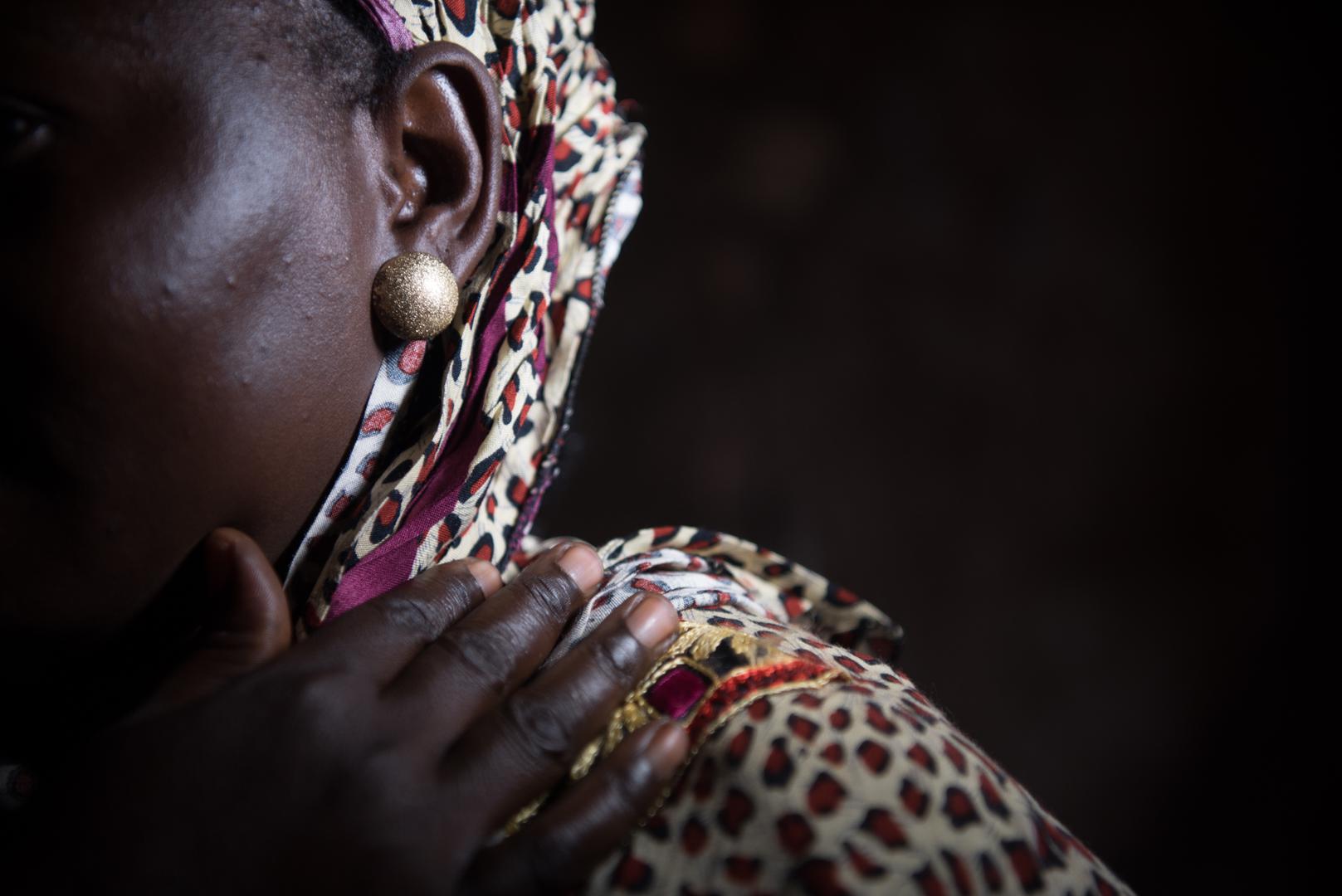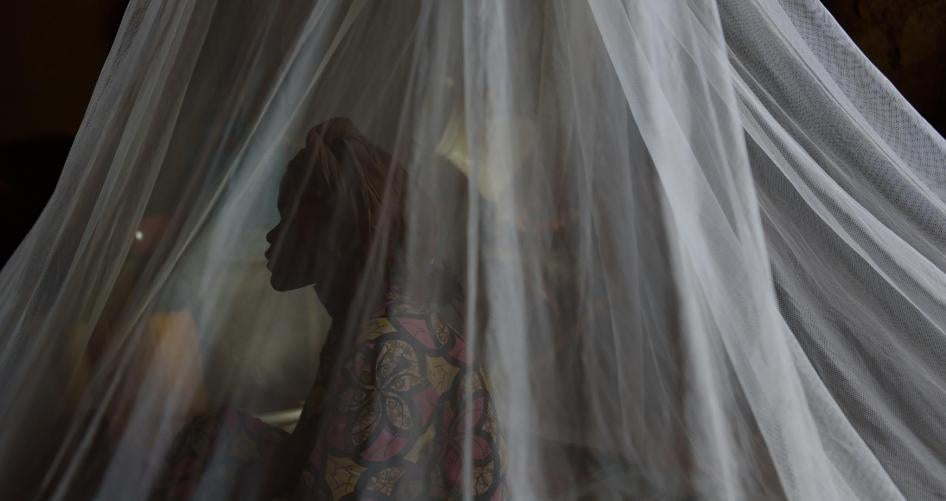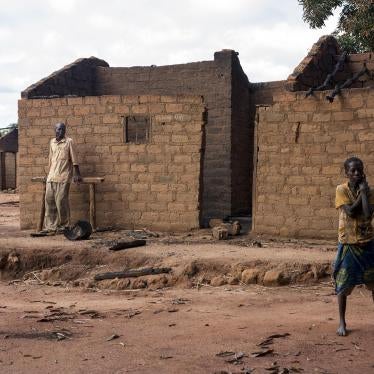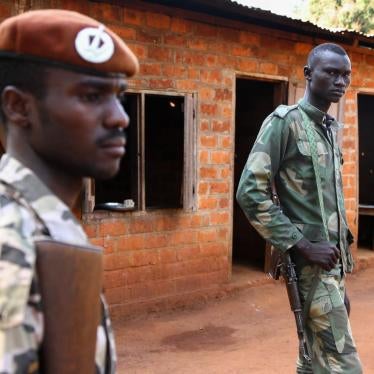(New York) – Armed groups in the Central African Republic have used rape and sexual slavery as a tactic of war across the country during nearly five years of conflict, Human Rights Watch said in a report released today. Commanders have tolerated widespread sexual violence by their forces and, in some cases, appear to have ordered it or committed it themselves.
The 176-page report, “‘They Said We Are Their Slaves,’ Sexual Violence by Armed Groups in the Central African Republic,” documents 305 cases of rape and sexual slavery carried out against 296 women and girls by members of armed groups between early 2013 and mid-2017. The predominantly Muslim Seleka and the largely Christian and animist militia known as “anti-balaka,” two main parties to the conflict, have used sexual violence as revenge for perceived support of those on the other side of the sectarian divide.
“Armed groups are using rape in a brutal, calculated way to punish and terrorize women and girls,” said Hillary Margolis, women’s rights researcher at Human Rights Watch. “Every day, survivors live with the devastating aftermath of rape, and the knowledge that their attackers are walking free, perhaps holding positions of power, and to date facing no consequences whatsoever.”
Human Rights Watch interviewed 296 survivors of rape and sexual slavery, 52 of them girls at the time of the attacks, as well as government officials, police, medical personnel, United Nations officials, and others.
Due to stigma, under-reporting by survivors, and security-related restrictions on research, the full number of sexual violence incidents by armed groups during the conflict is undoubtedly higher, Human Rights Watch said.
Most of the abuses documented are not only crimes under Central African law, but also constitute war crimes. In some cases, they may constitute crimes against humanity. But to date not a single member of any armed group is known to have been arrested or tried for committing sexual violence.
The documented cases of sexual violence by fighters in this report constitute torture, and in many cases the torture was not limited to the sexual violence itself, but was accompanied by other forms of abuse also amounting to torture. Survivors were raped by up to 10 or more men during a single incident. During attacks, fighters whipped women and girls, tied them up for long periods, burned them, and threatened them with death. Survivors reported injuries ranging from broken bones and smashed teeth to internal injuries and head trauma. Thirteen survivors, three of whom were children at the time of the attacks, said they became pregnant from the rapes.
Fighters often raped women and girls in front of their children or other family members. They were also forced to watch armed men rape their daughters, mothers, or other women and girls, or kill and mutilate their husbands and other relatives. In May 2017, fighters forced one survivor to watch as they raped and killed her husband before raping her.
Women and girls were held as sexual slaves for up to 18 months, often subjected to repeated rape by multiple men. Many were taken as fighters’ “wives” and forced to cook, clean, and collect food or water.
“Jeanne” (all survivors’ names have been changed), 30, said that about 20 Seleka fighters caught her and nine other women and girls – some as young as 16 – as they fled an attack in Bambari in June 2014. “The first day, five Seleka raped me. Every day we could not rest – every day there was rape, by different fighters,” Jeanne said. The Seleka held her at a base for six months. “Each fighter who arrived at the base, it was to rape us. If we refused, they hit us…. I went to look for firewood. I drew water, looked for water at the river, prepared their food. All of the women did this. All the women were raped each night.”
Women and girls often said they suffered incapacitating physical injury and illness, including HIV, because of rape, as well as suicidal thoughts and loss of livelihoods or access to education. Most had not received post-rape medical or mental health care – including medication to prevent HIV and unwanted pregnancy – due to a lack of medical facilities, the cost of services or transport to facilities, and misconceptions about available services.
Stigma and rejection also present significant barriers to women and girls disclosing rape or seeking help. Survivors said their husbands or partners abandoned them, family members blamed them, and community members taunted them publicly after rape.
Historic impunity for sexual violence in the country, as well as a largely dysfunctional justice system, give survivors little hope for justice, Human Rights Watch said. Only 11 of the 296 survivors interviewed said they had tried to initiate a criminal investigation. Those who had informed authorities faced mistreatment including victim-blaming, failure to investigate, and even demands to present their attackers for arrest. Three survivors said that their relatives had been killed, beaten, or threatened with death when they confronted members of an armed group responsible for their rapes.
The report names six individuals in leadership positions of an armed group whom three or more survivors identified as having committed sexual violence, or as having had fighters under their command and control who committed the crime.
The high levels of sexual violence underline the importance of getting the newly established Special Criminal Court (SCC) up and running as soon as possible, Human Rights Watch said. The court, which includes national and international judges and prosecutors, can help break the country’s entrenched impunity, but success will require sustained financial, logistical, and political support.
The UN peacekeeping mission to the Central African Republic, known as MINUSCA, should, under its mandate, help authorities to investigate cases of sexual violence and to identify, arrest, and prosecute those responsible for these crimes, Human Rights Watch said. It should also include witness and victim protection into support for the Special Criminal Court, particularly for sensitive cases, such as those involving sexual violence.
The Central African government and international donors should make it a priority to provide medical, mental health, legal, and socio-economic services for survivors of sexual violence, including outside of the capital, Bangui. Measures to reduce stigma are also critical to help survivors get life-saving care and to rebuild their lives.
“There needs to be a strong and urgent message in the Central African Republic that rape as a weapon of war is intolerable, that rapists will be punished, and that survivors will get the support they desperately need,” Margolis said. “Even in a conflict zone, the government and international institutions can and should work to make services available to all rape survivors now, and put rapists on the path to accountability.”
Selected Testimony from Interviews:
Sexual Slavery
“Each day, four [anti-balaka] came to have sex with me in the morning. Then five men at 3 p.m. and again at 7 p.m. In the morning four men, in the afternoon and evening, the commander plus four men…. They said, ‘You look like a Christian girl. You sell your sex to Muslims. Today you will see.’” – “Rachida” 25 (all survivors’ names have been changed)
Rape
“When one [Seleka fighter] took me by force, my husband said, ‘No, that’s a poor woman. Don’t do anything to her.’ One came and told him to be quiet and that he should undress. …. The leader said, ‘Me, I’m going to sleep with her husband.’ When I lowered my head, he told me to lift my head and watch. …Two came and took my two legs. They held them open. When the first one finished raping me, he called another one to bring a piece of clothing. He took [the clothing] and put it inside my vagina to clean out where the first man had been. I didn’t know what to do but scream. It hurt too much.
My daughter was crying. One said, ‘Why is the child crying like that?’ I heard them shoot the child. I cried to Jesus, ‘How can you allow this to happen?’ I just cried for my child…. I heard them fire and then it was silent. I didn’t hear her anymore. They shot my husband in the head with two bullets…. Before they raped me, I saw them start to torture him.” - “Irene,” 36
“One [anti-balaka fighter] said, ‘You need to take your clothes off so that we can have sex with you.’ I said, ‘I am still a virgin.’ He said, ‘If you are still a virgin, then we will break you in today.’ One ripped my clothes off and the other ripped off my underwear…. One grabbed my throat and threw me on the ground. He held my mouth shut while the first man raped me. I started to bleed. When the first was done the second man said, ‘I can’t leave you like this, I must rape you too.’ So he raped me as well.” – “Priscille,” 16, who said the men also raped her 10-year-old sister
Impact of Sexual Violence
“I was traumatized because on the street people would say, ‘There she is, the woman who was raped by the Seleka.’ At the house, my husband said, ‘You accepted that the Seleka raped you. Why did you not cry out? Take your things and leave.’” – “Yvette,” 27
“What am I going to do with this baby? I did not want it. Who will take care of it? My family is all dead and I have a murderer’s baby.” – “Béatrice,” 18, pregnant following rape by an anti-balaka fighter
Access to Services
“They told me to pay for medicines and I don’t have the means. It was for injections, serums, antibiotics – 4,500 CFA (US$7.67), 2500 CFA (US$4.26)…. [The doctor] did a consultation. He said I had internal injuries. I explained the rape to him. They didn’t do an HIV test. He told me that to do an HIV test I had to pay 1500 CFA (US$2.56).” – “Lorraine,” 30
Access to Justice
“When I would see them [moving around town], I was so scared, but there is no law here so I would go into my hut and cry…. [I]f the courts opened, then I would open a case [against them]. But I did not go to the gendarmes, because there you have to pay, and in the end, they do nothing.” – “Cecile,” 50
“They killed my husband, raped me, I don’t have my house, I’m infected [with HIV] – that’s what they have done to me. I want to bring them to justice because they have ruined my life. – “Mélanie,” 31











